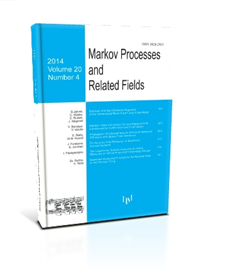Constructions of Markov Processes in Random Environments Which Lead to a Product Form of the Stationary Measure
A. Das
2017, v.23, Issue 2, 211-232
ABSTRACT
Recently Belopolskaya and Suhov \cite{belopolskaya2015models} studied Markov processes in a random environment, where the environment changes in a Markovian manner. They introduced constructions allowing the process to ``interact with an environment''. This was done in such a manner that the combined process has the product of the stationary measures of the individual processes as it's stationary measure. In this paper, a new construction is implemented, related to a product form for the stationary measure. This construction can be carried out with almost no conditions. However it requires the use of an additional state, denoted by $c$. The extent to which the combined process uses state $c$ indicates how far this process is from naturally having a product form for the stationary measure. To specify various aspects of the construction, we use an example from queueing theory, which is studied in detail. We observe how our construction works in this example, especially how the combined process uses state $c$. Physical interpretations lead to a refined construction also administered on a queueing theory background. In the refined construction the use of state $c$ agrees with an intuition.
Keywords: continuous time Markov processes, Markov processes in random environments, invariant measures, product-formula, queueing theory, neural avalanches
COMMENTS
Please log in or register to leave a comment

